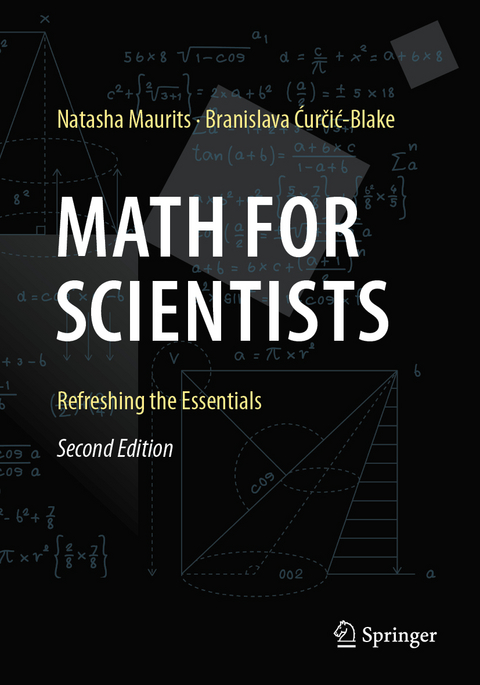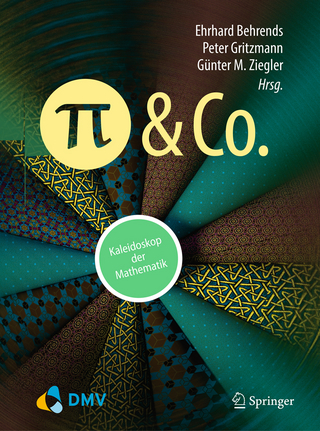
Math for Scientists
Springer International Publishing (Verlag)
978-3-031-44139-4 (ISBN)
This book reviews math topics relevant to non-mathematics students and scientists, but which they may not have seen or studied for a while. These math issues can range from reading mathematical symbols, to using complex numbers, dealing with equations involved in calculating medication equivalents, the General Linear Model (GLM) used in e.g. neuroimaging analysis, finding the minimum of a function, independent component analysis, or filtering approaches. Almost every student or scientist, will at some point run into mathematical formulas or ideas in scientific papers that may be hard to understand, given that formal math education may be some years ago. In this book we will explain the theory behind many of these mathematical ideas and expressions and provide readers with the tools to better understand them. We will revisit high school mathematics and extend and relate this to the mathematics you need to understand the math you may encounter in the course of your research. This book will help you understand the math and formulas in the scientific papers you read. To achieve this goal, each chapter mixes theory with practical pen-and-paper exercises such that you (re)gain experience with solving math problems yourself. Mnemonics will be taught whenever possible. To clarify the math and help readers apply it, each chapter provides real-world and scientific examples.
In this new edition, two new chapters covering statistics and differential equations have been added, which have been workshopped in the 'authors' popular lecture series in order to maximize the benefit for readers.
lt;b>Natasha Maurits is professor of Clinical Neuroengineering at the University Medical Center Groningen in the Netherlands. She is an applied mathematician by training and has experience in explaining mathematics to non-mathematicians, from children to adults, for over 25 years. She can explain mathematics in intuitive ways, avoiding formulas as much as possible. This approach is highly valued by her students. Bridging the gap between mathematics and other scientific fields is now her daily bread and butter, working as a mathematician in a hospital, and she enjoys explaining the use and beauty of mathematics.
Branislava Curcic-Blake works as an Associate Professor in neuroscience and cognitive neuropsychiatry at the University Medical Center Groningen in the Netherlands. She has trained as an experimental physicist (a study with a firm basis in mathematics) and did a PhD in neurobiophysics. Starting as a student and throughout her professional career, she has taught primary, high school, master and PhD students the intricacies of mathematics and physics, often motivating them to study these subjects independently with renewed interest.
Preface.- Numbers and mathematical symbols: natural, rational, irrational and complex numbers/complex plane: formula reading, often used symbols in mathematical formulas.- Equations: equalities and inequalities: expansions, series: fractional equations: equation solving techniques: various rules (such as Cramer's rule) to solve equations: introduction to basic functions (e.g. square, square root).- Trigonometry: trigonometric ratios, angles: trigonometric functions (sin, cos, tan) and their complex definitions: epicycles: Fourier series and transform.- Vectors: geometric interpretation of vectors: vector addition/subtraction, scalar multiplication: projections: inner product (including related aspects such as correlation, independence and orthogonality).- Matrices: basic matrix manipulations e.g. multiplication and inversion with examples such as the Jacobian, affine transformation, and rotation: Principal Component analysis in matrix notation.- Differentiation: limits and infinity: continuity of a function: the differential: basic differentiation rules: partial differential equations: introduction to dynamic systems.- Integration: explanation in terms of antiderivatives and area under the curve: basic integration rules: convolution.- statistics.- differential equations.
| Erscheinungsdatum | 11.11.2023 |
|---|---|
| Zusatzinfo | XVIII, 309 p. 118 illus., 58 illus. in color. |
| Verlagsort | Cham |
| Sprache | englisch |
| Maße | 178 x 254 mm |
| Gewicht | 580 g |
| Themenwelt | Sachbuch/Ratgeber ► Natur / Technik ► Naturwissenschaft |
| Mathematik / Informatik ► Mathematik | |
| Schlagworte | Epicycles • Formula Reading • Math Essentials • Math in Science • Math Refresher • MRI Processing • Neuropsychological Questionnaires • Spectral decomposition • Tremor Analysis |
| ISBN-10 | 3-031-44139-7 / 3031441397 |
| ISBN-13 | 978-3-031-44139-4 / 9783031441394 |
| Zustand | Neuware |
| Informationen gemäß Produktsicherheitsverordnung (GPSR) | |
| Haben Sie eine Frage zum Produkt? |
aus dem Bereich


